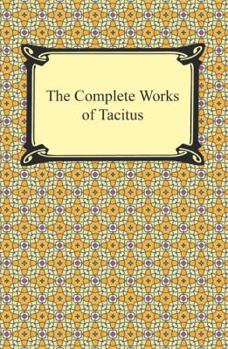The Complete Works of Tacitus
Select Format
Select Condition 
Book Overview
Tacitus was a Roman senator and historian. Tactitus' major works were The Annals and The Histories which covered the Roman Empire from 14 AD - 70 AD. The Complete Tacitus Collection includes the... This description may be from another edition of this product.
Format:Paperback
Language:English
ISBN:1420947141
ISBN13:9781420947144
Release Date:January 2013
Publisher:Digireads.com
Length:464 Pages
Weight:1.45 lbs.
Dimensions:1.0" x 6.0" x 9.0"
Customer Reviews
5 ratings
Preterist Proof
Published by Thriftbooks.com User , 15 years ago
This book is an excellent book by Tacitus who wrote down what he saw during the destruction of the temple. I mostly purchased this book as I was told in this one Tacitus saw the sign of the Son of Man just as Jesus predicted was to take place within their generation (Matthew 24:34) which Tacitus saw. Of course he did not see the bodily return which is still future, but this is just further proof of what Jesus really meant in Matthew 24 when He talked about His coming that resulted in carcasses Matthew 24:28, and mourning Matthew 24:30, and not the resurrection type of coming which is found in 1 Thes. 4, 5 which is not up to us to know when. With the bodily return at the end of our age there is no need for a sign in the sky because everyone will visibly see Him which results in resurrection. Due to the lack of the majority of Christians understanding passages like Isaiah 13:9 people easily misunderstand what is meant by His coming in Matthew 23-24. Josephus Wars also records similar sighting of the sign of the Son of Man in the sky. If you have a difficult time determining whether or not God can tell time based on the new testament verses, this is another book to get to prove God can tell time or keep track of His own invention of time.
Preterist Proof
Published by Thriftbooks.com User , 15 years ago
This book is an excellent book by Tacitus who wrote down what he saw during the destruction of the temple. I mostly purchased this book as I was told in this one Tacitus saw the sign of the Son of Man just as Jesus predicted was to take place within their generation (Matthew 24:34) which Tacitus saw. Of course he did not see the bodily return which is still future, but this is just further proof of what Jesus really meant in Matthew 24 when He talked about His coming that results in carcasses Matthew 24:28, and mourning Matthew 24:30, and not the resurrection type of coming which is found in 1 Thes. 4, 5 which is not up to us to know when. With the bodily return at the end of our age there is no need for a sign in the sky because everyone will visibly see Him which results in resurrection. Due to the lack of the majority of Christians understanding passages like Isaiah 13:9 people easily misunderstand what is meant by His coming in Matthew 23-24. Josephus Wars also records similar sighting of the sign of the Son of Man in the sky. If you have a difficult time determining whether or not God can tell time based on the new testament verses, this is another book to get to prove God can tell time.
A great critic of empire--yet a product of the imperial system
Published by Thriftbooks.com User , 16 years ago
I became interested in Tacitus while reading Robert Graves' I, Claudius. Having familiarized myself with the labyrinthine Julio-Claudian family tree, I thought I would give the Annals a try. I assumed I would find a chronicle of the debauchery and intrigues of Livia, Tiberius, Sejanus et al, which I did, but I was pleasantly surprised to find much more. Tacitus rose to prominence in an age of empire, but he nevertheless laments the decadence and complacency of his age, and looks back longingly to the stalwart and uncompromising republic. He caustically criticizes those of his own time who have traded freedom for safety under the imperial system. In the Annals, Tacitus focuses much on Germanicus, who he sees as a throwback to the days of the republic, and doomed never to realize his potential because he is born in the wrong era. Tacitus' most devastating criticism of empire, however, appears in the later small work, Agricola, which Tacitus wrote as an encomium to his father-in-law, Gnaeus Julius Agricola, a renown Roman general who served in Britain. At one point in the story, Tacitus places a speech in the mouth of a Scottish chieftain named Galgacus, whose force is preparing to do battle with the Romans. Galgacus' speech is at once a condemnation of Roman depredations, and a rousing call to arms to Galgacus' followers. It is a very inspirational speech, containing elements similar to Shakespeare's St. Crispin's Day speech in Henry V and Richard II's sceptr'd isle. Galgacus's speech is the source of the quote now popular among critics of U.S. foreign policy: "They make a desert and call it peace." Although in this translation it is rendered, "They make a solitude and call it peace."
Old-fashioned value
Published by Thriftbooks.com User , 16 years ago
Praise of Tacitus would be superfluous; but this edition is pure gold, unlike other series (ie. Livy) where one would sell it piecemeal the publishers have graciously bundled everything up in one unit, and deserve 5 stars for the effort, buy this book!...NOW!
"Impressive and Pristine Translation...The Best Out There"
Published by Thriftbooks.com User , 23 years ago
While Tacitus remains the most brilliant, eloquent, and important of all the Roman historians, his translators Alfred John Church and William Jackson Brodribb have purged the excessive verbosity and superfluity of style common in other translations to form a complete and precise representation of Tacitus' original. An amazing anthology at an affordable price...there's no better deal or collective genius of works available.





